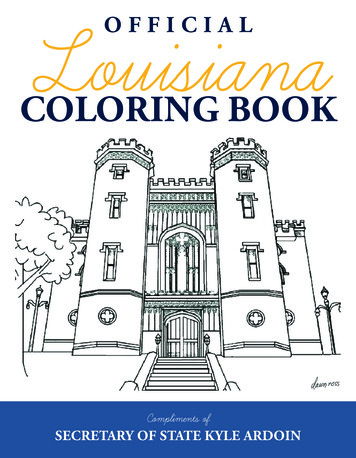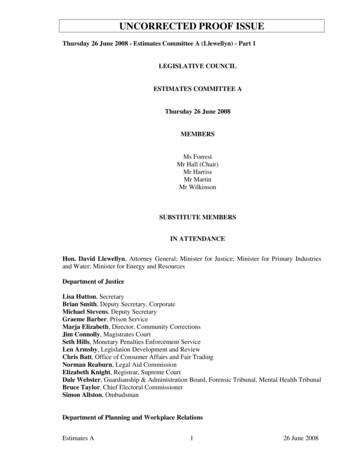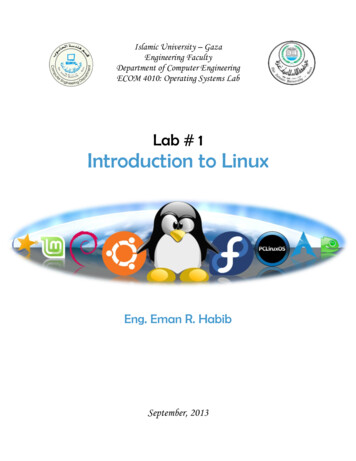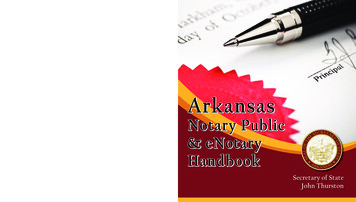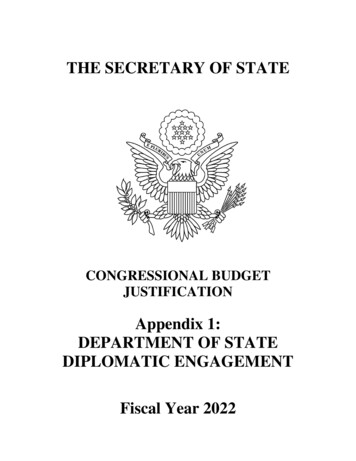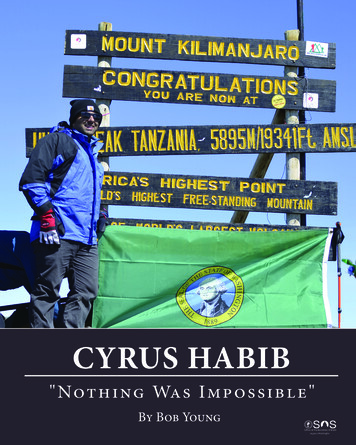
Transcription
CYRUS HABIB"Nothing Was Imp ossible"By Bob Young
Cyrus Habib"Nothing Was Impossible"Going into junior high school, Kamyar Habib flirted with reinventing himself.It wouldn’t be the last time. He was a blind, cancer-surviving Iranian American living in a Seattle suburb. And he was tired of kids making fun of hisname by calling him “Caviar.” “You’re right, I’m a delicacy,” he’d snap back. Armoredwit had become his first line of defense.He didn’t have a middle name, so he gave himself one, after a daring leader ofancient Persia, Cyrus the Great. He went by “K.C.” which added a hint of hipness toa bookish teenager who played jazz piano.By the time he got to New York City and Columbia University at 18, he wasfully “Cyrus.” Debonair in designer clothes and sunglasses, he became a publishedphotographer. “In New York you can be a new man,” Habib says, quoting the musical “Hamilton.”He won a scholarship to Oxford, the oldest university in the English-speakingworld, and aspired to be a literature professor. Then, he took a hard turn from academia’s abstractions toward the corridors of power. He opted to become an attorneyand headed to Yale, where he edited the law journal, while working, in his sparetime, for Google in London and Goldman Sachs on Wall Street.In 2012, Habib veered into politics, after sizing up the current crop of officeholders, and concluding, I can do that. Just four years later, he became Washington’slieutenant governor, and the first Iranian American elected to a statewide office inthe U.S.He was 35.His rise was hailed as “meteoric.” He could be governor before he was 40, aNew York Times columnist wrote. He might be the country’s first blind president,his friend Elizabeth Wurtzel, author of Prozac Nation, mused. He summited MountKilimanjaro in 2019, an apt metaphor for his ambition.Then he shocked his colleagues. On March 19, 2020, Habib announced hisplans to walk away from public office. He would take vows of poverty, chastity andobedience, in hopes of wearing the collar of a Catholic priest.He had felt his own pride swelling. He was treated like a celebrity in a culture
"Nothing Was Impossible"3that couldn’t get enough Kardashians. “It came very cheaply,” he said, of the way hewas courted by a New York literary agent trying to commodify his story.He had been put on a pedestal.And he admitted to himself he likedit. If he did move into the governor’soffice, he worried about its intoxicating grip. Stepping away from politics pre-emptively, he said, was like“giving your car keys to someonebefore you start drinking.”His devotion to Catholicism—Habib led a Washington delegation to India, where theyspecifically, its Jesuit order—was in- had a 90-minute audience with the Dalai Lama. Washingfluenced by his father’s death four ton State Leadership Boardyears earlier. But it was an intellectual decision as much as an emotional one. With his brash skepticism honed in NewYork, and lawyer’s training, he carried on a “c’mon, really?” debate with himself.Every critical thought that others might have, he weighed and measured himself.“It’s the most radical truth I know,” Habib says, “the idea of loving your enemies, the idea of sacrificing for another, these are radical ideas without precedent,that came into this world unexpectedly and changed the course of human history.”It’s not a step down, says Bob Ellis, who was Habib’s most influential highschool teacher. “What he’s specialized in, is expansion of his life.”Still, it’s not a given that as Habib reachesfor the mystical, he’ll make it through the arduous Jesuit training. The late John Spellman,a Washington governor of resolute character,did not, lasting just nine months in the decade-long process.On a visit to the California novitiatewhere he will study, Habib suggested that hedonate a Roomba robot vacuum so that heand other candidates for priesthood could usecleaning time for more pious pursuits.Caroline Kennedy gave Habib a JFK NewThe response of the others amounted to:Frontier Award in February 2020. Other“‘Dude, it’s not about that. This is going to beaward winners include Stacey Abrams andan interesting transition for you.”Pete Buttigieg. Twitter
4Cyrus HabibKAMYAR (kam-ee-are) HABIBELAHIAN (hah-beeb-eh-lah-hee-en) was born inBaltimore County, Maryland—once a colony founded as a sanctuary for Catholicspersecuted in England. His young parents had immigrated to the U.S. from Iran.His magnetic “braille to Yale” story owes much to their fearless love for their onlychild.Mohammad “Mo” Habibelahian and Susan Amini both came from affluent families who were neighbors in Tehran, Iran’s largest city. Both were raised innon-practicing Muslim homes.Mo’s father rose from youngapprentice to owner of a marblebusiness, with its own mines and factories; he also developed real estate.Mo was the middle of five children,all sent to England or the UnitedStates to be educated. He came to Seattle in 1970 to study civil engineering at the University of Washington.The American firm that hired himafter graduate school would eventually send him to Iran on assignment. Governor Jay Inslee with Mo Habib and Susan Amini.There, he began dating his younger Facebooksister’s best friend, Susan Amini.Her father was an engineer, in a family of soldiers. Her mother was from awell-educated Tehran family. (One of her cousins is John Sharify, an award-winningTV journalist in Seattle.) Susan went to a Catholic school, where she would laterteach English while she was an undergraduate at Tehran University. She spent summers at the Institut Catholique de Paris, living in a dorm run by nuns. She becamefluent in her third language, French.Then came 1979, when Iranians revolted at the corruption of the country’smonarch, Mohammed Reza Pahlevi, known as the Shah. The revolt, led by clergyand the working class, drove the Shah into exile. It created an Islamic state, run byAyatollah Khomeini. After President Jimmy Carter allowed the Shah to receive cancer treatments in the U.S., angry revolutionaries seized the American embassy inTehran and held its staff hostage.Mo and Susan were by this time engaged. But given the risk of being conscripted into Iran’s army—at war with neighboring Iraq—Mo moved back to theUnited States, settling in the Baltimore suburbs.
"Nothing Was Impossible"5He and Susan were married byproxy. He went to the Iranian consulate in Washington, D.C., and filledout the necessary forms. His fatherstood in for him in a February 1980ceremony. Susan went to Paris, andback to the nuns’ dorm, where shehad stayed during summers. Shewaited and waited for her visa to theU.S. She finally came in November1980. Kamyar was born in late AuAfter Ayatollah Khomeini became Iran’s “Supreme Leadgust the next year.er” in 1979, Mo Habib and Susan Amini immigrated toDespite tensions between the the U.S. and soon welcomed a son. Wikimedia CommonsU.S. and Iran, Mo and Susan weretreated well by their American neighbors. That became especially evident whentheir son was born with a rare cancer, retinoblastoma, caused by a genetic mutation.Neighbors and friends “adopted my parents, and became part of our extended family,” the lieutenant governor recalls. Many were Catholic. The newcomers were soonshowered with prayers, and found themselves going to Mass, and making a pilgrimage to a local saint’s shrine—although the Habibelahians didn’t convert.Kamyar began chemotherapy and radiation treatment to keep the cancer fromspreading. He lost sight in his left eye, first, when he was 2.The next year, his father was diagnosed with a rare cancer and began treatment.Habib’s mother vividly recalls tripsto hospital wards, and one scene in particular. A teenage girl, who had lost a legto cancer, was in her bed, receiving chemotherapy. But she was studying for anexam with fierce determination. “Andthis picture never left my mind,” she says,“of how strong you can be in the middleof this pain.”In a testament to his parents, thememories that spring to mind for theirBorn in 1981, Habib received the Helen Kellerson are not of his life-threatening disAchievement Award from the American Federationof the Blind in 2019. Office of the Lt. Gov.ease. “They filled my life with so much
6Cyrus Habibjoy and distraction and tried for me to have just such a normal childhood,” he recalls. “They really shielded me from what was going on, and how bad it was, andhow afraid they were.”Susan Amini had long been interested inthe American legal system, thanks to reruns of“Perry Mason” on television in Tehran. In Iran’slegal system, the burden was on the accused toprove their innocence. She was fascinated bythe courtroom drama’s depiction of presumedinnocence, rules of evidence, and jury trials.She saw that the most powerless person couldhave a voice in court.She was in her second year at the University of Maryland Law School when her worldSusan Amini was inspired to become an“went topsy-turvy.” Doctors had said that if attorney after seeing Raymond Burr playKamyar’s cancer did not recur in a couple years, “Perry Mason” on Iranian television. CBShe should be in the clear. He was just past thecalendar’s danger zone. “And here it was,” she recalls. Back again.The family saw a specialist in New York. The news was grim. Little could bedone to save their son’s eyesight. On the drivehome, while Kamyar slept in the car, his parentswere speechless. They just cried. Amini recallsthinking, “If we all died at the same time, it wouldbe a blessing.”She took life one-half day at a time. Anymore would’ve been too distracting. By the summer of 1989, she had finished her classes andKamyar was fully blind. Mo thought a changewould do them good. There was so much sadnessin Maryland. Mo’s brother lived in Seattle, andMo had friends in the area from his UW days.The family made a scouting trip in August. Seattle sparkled. Mo’s pitch was perfect. They movedwest in September.Habib had eyesight until 1989 and laterjoked that, in his mind, everyone stillKamyar enrolled in Bellevue’s Somerset Ellooked like Boy George or Cyndi Lauper.ementary School. It would be the scene of a proOffice of the Lt. Gov.found lesson.
"Nothing Was Impossible"7THERE ARE TWO ANECDOTES Cyrus Habib often tells about his life.One is that through the age of 8 he could still see in his right eye. So, all of hisvisual memories are of the 1980s. And everyone, in his mind, looks like Cyndi Lauper or Boy George.The other involves the day he camehome from Somerset Elementary andcomplained to his mom that during recesshe wasn’t allowed to play with the otherkids on the jungle gym. Instead, a recessmonitor kept the blind third-grader closeby. Amini wanted equal, not special treatment for her son. Fresh out of law school, Habib survived cancer and endured treatmentsshe went to the principal’s office, with her but eventually lost his sight. Office of the Lt. Gov.son in tow. She offered to sign a waiver releasing the school of liability if her son got hurt. She promised to teach him theterrain. Then, mother, father and son spent evenings and weekends learning how tonavigate the playground and jungle gym.At times, Amini would visit the school and see her son high above his peers onthe jungle gym. Her first impulse was, “What have I done?”But a broken arm, she surmised, would mend more easily than a broken spirit.She and her husband had decided, “not to make our fear his.”It wasn’t easy. Their instinct was to hold their son tightly. But they didn’t wantto hold him back because of their ideas of what he couldn’t do. Their minds’ limitations should not become his. They had to open doors, to education, arts, music andmore, and let him “fly as far and high” as he could.Before he became a rabid reader, Kamyar was introduced to music, startingpiano lessons at 5. Soon after, he got his most prized possession. His parents gavehim a cassette tape recorder—and it was a dual-deck model so one cassette could record from the other. “That was high tech, right, back then,” he recalls. He’d tune intoCasey Kasem’s weekly radio countdown of Top 40 hits, and make his own mix tapes.While other kids learned cursive writing, he learned braille. With the confidence his parents gave him, he took up downhill skiing. His dad signed up to be aparent-chaperone at ski school to keep an eye on him. He’d call his mom apres ski,excited to tell her he fell 20 feet that day. Great, she’d say, do it again.In school, other kids teased him at times, throwing things at him from across
8Cyrus Habibthe room, and holding up fingers infront of him and asking how many hesaw. In response, he developed a kindof armor. “I learned to rely on myintelligence and I think that I developed a kind of arrogance around being smart that was rooted in that kindof insecurity. It became my crutch. Itbecame, you know, the kind of thingthat I would belittle others for if I feltHabib also took up martial arts after losing his vision.at all threatened or excluded, because“We were afraid of a lot of things. But we had to find aI knew that was the terrain where Iway for Cyrus to be able to have those experiences thathe wished to have,” his mother said. Office of the Lt. Gov.had an advantage.”For sixth grade, he enrolled inBellevue’s International School, a new public school that combined middle schooland high school, and featured a program of core classes—including French—thatstudents would take all seven years. Some courses, such as U.S. history, were eventaught in French.Middle names are not traditional in Persian culture. Without one in America, Kamyarfelt left out. He had asked his parents a few yearsearlier if he could have one. He chose Cyrus, after the founder of the first Persian empire morethan 2,500 years ago, a conquering ruler knownfor mercy.His mom went to court to add the new middle name. She returned in a few years to shortenthe family’s last name. Habibelahian was actuallytwo words in Farsi, Iran’s predominant language.And it was cumbersome in any form, with Kamyar applying for language-immersion camps andmore. (He had finished first in a national French As far back as elementary school, Habibkept track of presidential elections. “He wasexam and won a scholarship to a summer school our encyclopedia,” Susan Amini recalls.in Minnesota.) He was also about to step out in Office of the Lt. Gov.public as a musician. His parents lopped off thesecond half of his surname.“I kind of wanted to be a new person and project myself differently,” Habib
"Nothing Was Impossible"9says of the new initials he went by, which “sounded cool as a piano player.” Hislessons had evolved under a new teacher from practicing endless scales and fingerexercises to learning how to improvise. From there, it was a short stretch to blues,boogie and jazz.He ended up getting business cards, engraved “K.C. Habib.” He played atNordstrom, for hours at a time, all by memory. He supplied music for a wedding reception in Seattle’s tallest skyscraper. “He’s a beautiful, incredible piano player,” saysBob Ellis, who taught history, French, and physical education at the InternationalSchool.“NOTHING WAS IMPOSSIBLE” for K.C., says Ellis. He wasn’t afraid of anything.“This guy doesn’t know he can’t do it. So, he figures it out.”It helped to have a teacher like Ellis, who typed up Habib’s tests in braille, believing he should take them at the same time and place as his classmates.His best friend at the International School was Les Carpenter. Les was a yearolder and musical. K.C. looked up to him. “They were a good pair,” Susan Aminisays. Carpenter still thinks of them watching “Pulp Fiction” together while theywere middle schoolers. They’d get shushed and Carpenter would say, “Why? I’mexplaining the movie.”Their friendship revolved mostly around politics, which ran in Carpenter’sblood. His grandmother was a journalist who had gone to work for fellow Texan,Vice President Lyndon Johnson. On the flight back to Washington, D.C. after JohnF. Kennedy’s assassination in Dallas, LizCarpenter’s instincts prodded her to pullout a pad and pencil. She knew reporterswould be waiting on the tarmac, and shewanted the new president to be ready. The58 words she jotted down came to her, asif “God-given.” Standing in the glare offloodlights as Kennedy’s casket was beingremoved from Air Force One, Johnsondelivered Carpenter’s closing lines withhumble solemnity: “I will do my best.That’s all I can do. I ask for your help—andIn high school, “K.C.” Habib and his friend LesCarpenter jammed with the house band at TheGod’s.”Scarlet Tree, a Seattle bar and restaurant knownShe would go on to help lead thefor dishing out live blues, jazz and rock.Office of the Lt. Gov.national campaign for an Equal Rights
10Cyrus HabibAmendment. Ann Richards, the former Texas governor, described her longtimefriend as “the tilt-a-whirl at the State Fair with all the lights on and the music.” Except, “with Liz, the ride never comes to an end.”The bond between her grandson and K.C. involved a lot of arm-waving debate. Whatever the issue of the day was—affirmative action, funding for AIDS research, banning landmines—they were trying to solve the world’s problems. Loudly,at times. “We’d argue super passionately and it would be really uncomfortable forwhoever else was riding in the car,” recalls Les Carpenter, now an Episcopal priestin Texas.They drove in “Rocinante,” Carpenter’sold Chevy (named after Don Quixote’s steed),to The Scarlet Tree in North Seattle. The houseband at the restaurant and bar would let teenagers sit in one night a week. Most were students of one of the guys in the house band. Theyplayed the blues, with K.C. on keyboard andLes on guitar. “It was a thrill because we wereplaying with real musicians in a quality divebar,” Carpenter says.K.C. Habib excelled in classwork, thoughit often required a political struggle. The school “It was a thrill because we were playing withreal musicians in a quality dive bar,” says Lesdistrict, in one example, would not accommo- Carpenter, who became an Episcopal priest.date him when it came to physics, because the Twitterteacher wouldn’t allow him to do lab work. So,he took physics at Bellevue College—and got an “A.” He enrolled in other math andscience classes at the college, which was more obliging, and “brailled everything.”Even then, he and his mom had to battle district officials, who wanted to keep a“withdrawal” from high-school physics on his transcript. That wouldn’t look goodwhen he applied to elite colleges. He didn’t withdraw, his mom argued. “It was aclass you cannot teach.”Lack of resources was not the problem. Bellevue was a wealthy district. Thebigger obstacle, Habib says, “was just willpower and understanding.”Thankfully, he had a scrappy “24-hour pro bono attorney” at home. His momfired off frequent letters to the school district. But she never had to file a lawsuit.Ellis appraised his prize student this way: “Assertive, yes; confrontational, ifnecessary. But always well-versed, and almost always nice.”
"Nothing Was Impossible"11FROM SEATTLE’S EASTSIDE SUBURBS to the west side of Upper Manhattan.That was Habib’s journey in the fall of 1999 when he registered at Columbia. Now“Cyrus,” he had long been fascinated with New York. He would not be disappointed.As alumnus Herman Wouk put it, “the best things of the moment were outside therectangle of Columbia; the best things of all human history and thought were insidethe rectangle.”Columbia’s storied alumni range from Alexander Hamilton to Amelia Earhart, Ruth Bader Ginsburg to Allen Ginsberg, J.D. Salinger to Ursula K. Le Guin.Soon, Habib says, he was one of those “insufferable college kids who comesback from living in New York and has just a bit of a concocted New York accent, andlikes to say things in a New York-y way, and knows better, and is kind of a wise guy.”He fell for the city and its mass of humanity. In Manhattan, the streaming,teeming flow of pedestrians makes life easier for a blind person. Along with its gridpattern, and abundant subways and taxis, and people who think nothing about redirecting you if you stray, it’s certainly more navigable than a suburb. Merchantsaren’t set back from sidewalks. You can smell that pizza. And it’s easy to ask directions. “You know, nobody cares about you, and you’re not going to stick out whetheryou’re blind or not,” Habib says, kind of like a wise guy.Midway through Columbia he became a published photographer. Peter Buchanan-Smith, arts editor of The New York Times op-ed pages, was putting together aquirky book about the city, Speck: A Curious Collection of Uncommon Things. Buchanan-Smith asked a mix of residents to explore their worlds through small and ordinaryobjects. He got chapters on manhole covers and pocketbooks and flyers for missing pets. Habib tooka disposable cameraaround his Morningside Heights neighborhood.As for his photos,he says, you tell himhow they came out.His interest inpolitics had grownsince his mother tookhim to see PresidentHabib’s photos of his New York City neighborhood were featured in Speck: ACurious Collection of Uncommon Things, published by Princeton ArchitecturalBill Clinton at Seattle’sPress. SpeckParamount Theatre in
12Cyrus Habib1996. He never really considered becoming a Republican. Newt Gingrich’s GOP ofthe era seemed stingy if not anti-government. Habib deeply appreciated the Washington Department of Services for the Blind, where he learned to use a walkingcane. The Washington Talking Book & Braille Library helped him master reading,and trained him how to use text-tospeech software.He was scheduled to start an internship in Senator Hillary Clinton’sManhattan office on September 14,2001—three days after the terrorist attack on the World Trade Center. “I remember it was difficult to connect byphone with my parents,” the lieutenantgovernor recalls. “And I remember you could smell the fire.”Once ensconced in Clinton’s office, the chief lesson Habib took from After a summer internship with U.S. Senator MariaCantwell in Washington, D.C., Habib was an intern in911 was that when a community faces a Hillary Clinton’s New York office just days after terroristscrisis, government has a chance to shine. struck the World Trade Center. Robert J. FischAll kinds of people, whose lives were disrupted in all kinds of ways, called the most famous and powerful person they knew:Hillary Clinton. Answering phones in her office, Habib heard from desperate peopleall over the city, often in “colorful language.”The literature major started changing his classes that fall, enrolling in coursesdealing with the Middle East. “Basically,” he recalls, “my twenties were a decadeof coming to terms with being Iranian American and coming to terms with beingblind. Neither of which I really wanted when I set foot on campus as a freshman. Ireally didn’t want to be known for either. I wanted to fit in, and I wanted to be cool,and I wanted to be a New Yorker and all those things.”Although he was intrigued by Middle Eastern studies, and the idea of practicing law one day, he graduated from Columbia thinking he still wanted to be aprofessor, writer and “public intellectual.”AN ENDURING TRADITION brought together the Americans awarded RhodesScholarships to Oxford University in England. Scholars hailing from all over theU.S. would congregate in New York for a festive “Sailing Weekend,” then board aship together for a jaunt across the Atlantic. In the modern airborne era, the event
"Nothing Was Impossible"13became “Bon Voyage Weekend,” and in 2003, the elite students gathered in Washington, D.C., before flying over the ocean.Among the 32 American standouts, one, in particular, stood out. Habib “waseasily the best dressed member of the group,” recalled one fellow scholar, ChesaBoudin. “His Armani tie complimented his tailored shirt and crisp pinstripe suit.He had a penchant for details—manicured fingernails, a unique wrist watch, cufflinks, and matching accessories. No matter the setting, he had on perfect designersunglasses and would often switch between several in the course of a day.”Habib and Boudin were soon friends. “I found his sharp quick wit and oftencaustic sarcasm endearing,” Boudin later wrote. “I was impressed that rather thanletting his blindness relegate him to the background, as I assume, or imagine, as asighted person, it might easily have done, he confidently asserted himself and hisideas no matter the setting.”*Habib picked up his sartorial flair in NewYork. “I became very concerned with how I look,and not really just in a vain way, although therewas definitely vanity involved, but just really, youknow, the idea of not looking disabled, not looking different, not looking weak, not looking vulnerable, not looking, you know, dependent, butexuding power, exuding privilege in a way, youmight even say.”That impulse spilled into his social life,whether he was hosting a loud late-night Bon Voyage hotel party, or asking “hard-hitting questions”to a “senior CIA official” during a scholars’ tour ofthe spy agency the same weekend.“I think there was this desire to be, youknow, the center of attention, and to show people Habib was “easily the best dressed” of thethat whatever assumptions you may have about 32 American scholars awarded Rhodessomeone who’s blind, those are not applicable to Scholarships in 2003, said his friend ChesaBoudin. The Paul & Daisy Soros Fellowshipsme.” He wanted to walk into a room and have his for New Americansblindness be the last thing someone would notice.His interior life would begin its makeover in his second year at Oxford.Friends he had met during Bon Voyage Weekend invited him to attend a Cath* Boudin was elected District Attorney of San Francisco in 2019, the post that propelled the political career ofVice President Kamala Harris.
14Cyrus Habibolic Mass. That Habib even entertained the idea seemed strange, almost “bizarre.”True, he had attended Mass as a child. In adulthood, though, he was not religious.And he was very conscious of his Middle Eastern heritage.Oxford was steeped in Christian history. Latin inscriptions and the sound ofbells were common on its grounds. The university is home to 39 “constituent” colleges. Habib was studying at St. John’s College, founded in 1555, to educate RomanCatholic priests. Just to the west of it was Blackfriars hall, run by the Dominicanorder of the church.The environment, and friends,encouraged Habib to experiment.The Mass was simple and strippeddown. Yet the ritual—with its Gregorian chants, smells and bells—wasmulti-sensory. And it asked the assertive Habib to quiet himself. “I foundthe music beautiful. I found the kindof haunting solemnity of [the Mass]When he attended a fateful Mass at an Oxford chapel,beautiful. I found it to be transcenHabib wasn’t even sure he believed in God. Blackfriarsdent, you know, pulling me up towardsOxfordsomething.”The date was November 14, 2004. In the months afterwards, he kept comingback to the experience. And he found himself reading the Bible with more of anopen mind.He would not formally convert until Easter 2007. In the meantime, he wrappedup his master’s thesis, titled “Visible but Unseen.” It focused on two novels: RalphEllison’s Invisible Man, and Salman Rushdie’s The Satanic Verses. One was the storyof a black migrant in New York, the other about brown immigrants in London. Onewas photographic in its language and scene-making, the other, cinematic in its magical realism. He was getting at the sense, that if you’re from a certain minority group,you may be hyper visible and stand out. But in another sense, you’re unseen—yourstory is not being told, you’re put in a ghetto.He was having a harder time envisioning himself cooped in an ivory tower. Hewavered about pursuing a doctorate in literature. He traveled, searching for more.Maybe he’d work in global business, or public policy.He got a nudge from his mother. “I just remember her saying at one point,‘Okay, this is your third year at Oxford. You’ve got to figure out what you’re goingto do next.’ ”
"Nothing Was Impossible"15“I CHANGED MY MIND a bunch of times,” Habib recalls. He realized he wantedto get “into the corridors of power,” to make a difference. He decided law school wasthe best path for developing the tools of statecraft and advocacy.In 2007, his first year at Yale, a national policy issue grabbed his attention: Canwe make American currency accessible to the blind? In England, as he had learned,blind people could differentiate one bill from another. And he realized the issue herewasn’t just about a blind consumer being able to tell a 5 bill from a 10 bill. Thiswas an obstacle to employment because many entry-level jobs required the abilityto denominate one bill from another.After a lawsuit by the American Council for the Blind, a federal judge hadordered the U.S. Treasury Department to make currency recognizable to the blind.Habib weighed in with an opinion piece for The Washington Post, headlined “ShowUs the Money.”He wrote of the generous drivers, baristas and store clerks who hadn’t rippedhim off. But why was that even an issue? There were 180 countries whose currencywas designed to be “distinguishable by all.” It could be done with raised ink, modifying the size of different bills, or producing a tactile mark, or sort of raised stamp,to indicate a bill’s value. But the Treasury Department balked at the cost of makingchanges.Habib cited the staggering 70 percent unemployment rate for the blindin the U.S. He invoked the sacrifices thatbrought about the landmark Americanswith Disabilities Act. Currency for blindpeople should be as important as braille inelevators, he said. He also testified beforeCongress and co-authored a legal briefwith classmate Jonathan Finer, who wenton to become a deputy national securityWithout tactile features on U.S. paper currency, blindadvisor under President Joe Biden.people can use small electronic devices to identify billHe came to appreciate the way hed
fluent in her third language, French. Then came 1979, when Iranians revolted at the corruption of the country's monarch, Mohammed Reza Pahlevi, known as the Shah. The revolt, led by clergy and the working class, drove the Shah into exile. It created an Islamic state, run by Ayatollah Khomeini.
